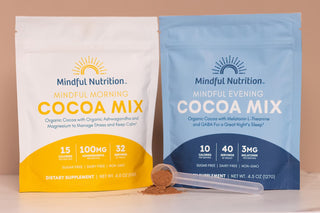Did you know that up to 80% of today’s processed foods contain genetically modified ingredients? (Source)
But when you’re committed to improving your health through clean eating, every ingredient matters.
Today's product labels can be extremely helpful in helping consumers choose the foods that align with both their dietary and environmental values.
Here, we’re breaking down what non-GMOs and organic products are, how they compare to the organic foods in your pantry, and how these fit into your overall diet and lifestyle.
Key takeaways:
- Genetically modified organisms (GMOs) are used in up to 80% of today's processed foods
- Sometimes, GMOs are used to improve crops, helping food manufacturers produce and distribute shelf-ready products
- While similar, non-GMO foods and organic foods have distinct characteristics
- Carefully reading food labels can help you determine whether foods are non-GMO or organic
Keep Reading: Hot Drinks Do More Than Keep You Warm: Benefits of Warm Drinks
What are GMOs?

Not all of today's foods are naturally ready for human consumption. Some crops and foods are genetically modified to improve characteristics such as shelf life or resistance to pests.
That's why genetically modified organisms, or GMOs, are found in many of today's processed foods.
GMOs are plants, animals, or microorganisms that have been altered by biotechnology in order to change their characteristics. Some uses of biotechnology include techniques that use synthetic genetic sequences to change an organism’s DNA or RNA, or forcing unrelated organisms to join together when they wouldn't otherwise in nature, which defies conventional breeding methods.
These GMOs are present in many of today’s food and personal care products, helping to improve things like shelf life or a particular crop's ability to resist pests.
GMOs are capable of withstanding several environmental factors that non-GMO items simply can't.
And, although GMOs are present across various industries, sectors like agriculture, personal care, and animal feed can all require additional oversight to obtain third-party certification. These certifications are helping to raise the standard of production for items across various sectors.
Benefits of GMO foods
Given the popularity of GMOs and their prevalence in today's agricultural industry, it's important to truly understand what they bring to the table and how this affects your health.
There are several advantages associated with genetically modified foods, from greater crop yields to economic benefits. Let's break these down:
Crop yields: GMO crops can be engineered to produce higher yields. With the ability to grow more crops, farmers can help in curbing food shortages and reducing the cost of food for consumers.
Nutritional value: Some genetically engineered crops are developed to contain higher levels of certain vitamins and minerals.
Pesticide use: Some GMOs are capable of resisting insects and tolerating herbicides. This can minimize the need for synthetic pesticides, which can have environmental impacts and high-risk ingredients that may jeopardize human health.
Overall, the benefits of GMOs mean that communities across North America have greater access to products that may be otherwise inaccessible.
Bonus: What Does It Mean for a Manufacturing Facility to Be GMP-Certified?
What does non-GMO mean?

Simply put, non-GMO (GMO-free) is used to describe products containing ingredients derived naturally. In other words, those that haven't undergone genetic modification.
Non-GMO foods typically display a “Non-GMO” label to help consumers distinguish them from regular GMOs.
Familiarizing yourself with the benefits of non-GMO foods can help you make better decisions regarding your products of choice.
Benefits of non-GMO foods

Genetically engineered foods are common, but that doesn't mean they are always healthy. Paying close attention to labels, ingredients, and nutrition can help you on your journey toward a healthier lifestyle.
While genetically modified foods, such as genetically modified crops, can offer various advantages to both manufacturers and consumers, non-GMO foods have their own unique set of benefits.
Some of these benefits include:
- Higher nutritional value: Some organically grown foods may contain different nutrient levels compared to conventionally grown crops, depending on farming practices and soil conditions.
- Fresher quality: Some non-GMO or organic foods are produced without certain preservatives, which may affect how fresh they taste or how long they last.
- Fewer toxins and allergies: Some consumers choose non-GMO products to align with their personal preferences or food sensitivities.
- Reduced chemical exposure: Some non-GMO foods are often made without exposure to synthetic herbicides, chemical fertilizers, pesticides, and other chemicals.
- Committed to sustainability: Non-GMO farming practices can help support and promote organic farming, which promotes a more sustainable food system.
What is Non-GMO Project Verified?
The Non-GMO Project Verified label is a third-party certification that demonstrates a manufacturer has sourced and processed ingredients in a way that steers clear of GMOs.
This label helps consumers identify products that avoid genetically modified ingredients or foods, aligning with their environmental or sourcing preferences.
Non-GMO Project Verified testing takes place at various stages of an item’s production to ensure GMO contamination is avoided from start to finish.
These products contain only ingredients not derived from GMOs, or that contain them in very low levels. They are verified by the Non-GMO Project, which subjects products to the most rigorous standards in North America.
While Non-GMO Project Verified products don’t contain GMOs, that does not mean the product is organic. It is also not indicative of other health claims, such as pesticide-free or low sugar.
What does organic mean?

Organic ingredients play an integral role in many of today's clean diets. As far as an organic label, products that display organic certification from the USDA are generally trusted by consumers.
A product classified as organic has been produced and handled in accordance with a specific set of federal guidelines that focus on:
- Soil quality
- Pest and weed control
- Animal raising practices
- The use of additives
Overall, the aim of organic certification is to minimize synthetic ingredients and instead prioritize the natural process of food harvesting.
These regulations aren't just for agricultural products. They apply to animal products, too.
USDA organic certification dictates that organic meat, poultry, dairy, and eggs must be derived from animals raised in appropriate conditions, are fed 100% organic feed, and are free of growth hormones and antibiotics.
What is the difference between non-GMO and organic?
There is often confusion among consumers regarding non-GMO labels and USDA organic certification food labels.
While similar in their shared commitment to healthy, naturally processed foods, both contain distinct characteristics that set them apart.
So, what is the difference between the two?
While all organic products that display the United States Department of Agriculture (USDA) certified organic label are non-GMO, not all GMO-free products are organic.
This is because organic farming practices strictly prohibit GMOs, as well as the use of synthetic fertilizers, synthetic pesticides, and other chemicals.
On the other hand, to be classified as non-GMO, a product simply must not contain genetically modified ingredients, instead using traditional methods of farming and harvesting.
Some products and brands can be both USDA Organic and Non-GMO Certified, like Mindful Nutrition. We use non-GMO ingredients in all our products, from our Sugar-Free Hot Cocoa Blend to our Magnesium-Infused Hot Chocolate Drinks.
Conclusion
The products we consume and the ingredients they contain can influence our diet, lifestyle, and wellness.
From canola oil to eggs and dairy, a variety of today's most popular food products are considered GMO. And, while there are many benefits to GMOs for food manufacturers and consumers, that doesn't mean you must make them a regular part of your diet. There are other ways to ensure the foods you are eating align with your health goals and your environmental beliefs.
Keep Reading: How Much Caffeine Is in Hot Chocolate?
--
Mindful Nutrition is a veteran-owned company with a passion for wellness. We use natural ingredients in our products, including melatonin, GABA, ashwagandha, and L-Theanine. Our hot cocoa blends are vegan, non-GMO, and plant-based, crafted to be a comforting addition to your daily ritual. We utilize third-party testing on all products to ensure purity, quality, and safety. To stay connected and learn more, follow us on Facebook, Instagram, and LinkedIn.
--
These statements have not been evaluated by the Food and Drug Administration. Our products are not intended to diagnose, treat, cure, or prevent any disease. The content on this website is for informational purposes only and is not intended as a substitute for advice from your physician or other healthcare professional. Always consult with a qualified healthcare provider regarding any medical condition or health concerns.















